Distinguished Teaching Award
Rick Bonus
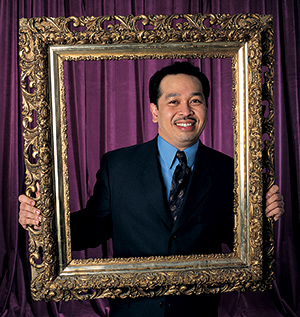 When American Ethnic Studies Professor Enrique “Rick” Bonus applied for tenure, he was asked to write statements about his research, teaching and community service. But separating these three aspects of his work was difficult, he says, “because they are all interrelated in what I do as a scholar.”
When American Ethnic Studies Professor Enrique “Rick” Bonus applied for tenure, he was asked to write statements about his research, teaching and community service. But separating these three aspects of his work was difficult, he says, “because they are all interrelated in what I do as a scholar.”
In his research and teaching, Bonus borrows from other disciplines, combining history with contemporary culture, literature with sociology. And he doesn’t teach about ethnic groups individually. “In my work, as well as in every course that I teach, I make sure I don’t focus on just one group, as if they’re not in contact with other groups,” he explains.
“Broadly defined, what I do is study power in American society. I use the experiences of all different groups in relationship to power and how power works or doesn’t work.”
The only tenured Filipino American at UW, Bonus is a role model to his students. “Many students aspire to become like Rick Bonus,” writes a Seattle community member supporting his nomination for the Distinguished Teaching Award. The Pacific Islander Student Commission, which Bonus advises, adds their support, saying, “Our commission is inspired by [his tenure] because not many professors of color attain such a status, especially within the Pacific Islander community.”
Bonus admits to some mixed feelings about being a minority faculty member at UW, where he is director of undergraduate studies in the department. “From the point of view of being a Filipino American, being here is something to be proud of. My presence here represents some achievement of people in my community,” he says. “On the other hand, it’s not something to be completely celebratory about because, I think, on this campus we need a lot of work in recruiting more minority faculty.”
Two years ago some of Bonus’ students wanted to improve graduation and retention rates for Pacific Islander students. Under his tutelage, they formed the Pacific Islander Partnership in Education (PIPE). “One of the things the students identified was a lack of role models in schools, which are alien environments for a lot of them,” Bonus explains. Student-mentors reached out to other students who were at risk of dropping out, providing study groups, encouragement and help navigating through the school system.
“With his teaching and leadership, a very special and significant constituency of students at UW is becoming visible, heard, and integral to educational efforts being made today,” wrote Department Chair Stephen Sumida.
Known as a popular and effective teacher, Bonus “is not bombastic but, rather, uses the gentle nudge,” commented another colleague.
Bonus says he draws energy from the dynamics of the classroom, where he enjoys what he’s doing, and students can tell. “I do a lot of jokes in my class. Most of them don’t fly,” he laughs. “It’s about schooling as a pleasurable experience — and pleasure doesn’t mean you don’t have to be serious. Pleasure is about enjoying what you’re learning and making meaning out of what you’re learning.”
American ethnic studies is meaningful to students, Bonus says, because what they learn is relevant to their lives. “I really think they should be part of ongoing conversations in and out of the classroom,” he says, adding that he tries to teach all sides of controversial issues and expects students not to agree, but to understand the arguments. “When they encounter someone outside the classroom who’s on the opposite side of what they think, at least they’ll know where that person is coming from and be a better person to converse with.”
Lisa Coutu
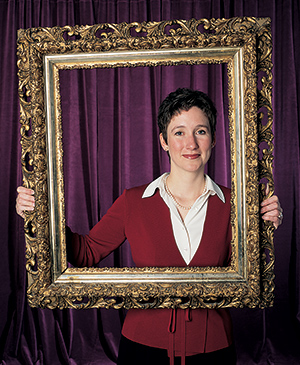 Seventeen students sit in a semi-circle as Senior Lecturer Lisa Coutu leads them in figuring out how to apply course concepts to real life. Several students volunteer answers when she asks, “How?” and “Why?” and “What if?” Coutu calls on a student not participating in the discussion, but he doesn’t know the answer. She moves on to another student. At this point the first student opens his book. When Coutu asks another question, two students who have already spoken raise their hands. The student who just opened his book raises his hand, too, and Coutu calls on him. He gives the answer, and the class moves on, every student now fully engaged.
Seventeen students sit in a semi-circle as Senior Lecturer Lisa Coutu leads them in figuring out how to apply course concepts to real life. Several students volunteer answers when she asks, “How?” and “Why?” and “What if?” Coutu calls on a student not participating in the discussion, but he doesn’t know the answer. She moves on to another student. At this point the first student opens his book. When Coutu asks another question, two students who have already spoken raise their hands. The student who just opened his book raises his hand, too, and Coutu calls on him. He gives the answer, and the class moves on, every student now fully engaged.
Five years later, the colleague who witnessed this class writes in support of Coutu’s nomination for the Distinguished Teaching Award, “Lisa works to make students feel comfortable, without letting them off the hook.” Coutu is an expert, says the colleague, in creating a climate in which students feel respected and comfortable in speaking out. “I have long admired Lisa’s ability to respond to incorrect answers in a face-saving manner.”
Coutu, whose communication courses range in size from five to 500 students, and from introductory surveys for undergrads to professional skills seminars for doctoral students, is known for classes that are as lively and interesting as they are serious and difficult. She incorporates films, novels, current events, online homework, Internet discussion groups and anything else she can think of to involve students in the subject.
“If I can use an example that makes people laugh, they’ll remember that example. And if they remember the example, they’ll remember the concept better,” she explains. Coutu objects, however, when her class is described as “entertaining.”
“I worry sometimes that we feed students’ desires to be entertained, and that’s not what I try to do,” she says. “Anything I do that is entertaining or fun is done with the purpose of helping them learn and remember the material.”
Her students are surprised when she professes to be genuinely shy. “I was always the kid in class who sat in the back and didn’t say anything.” As an undergraduate, a teacher noticed her and helped her to feel comfortable participating in class. “That kind of attention from a teacher changed the way I thought about myself in the classroom and whether I had a voice,” Coutu says. She has become skilled in drawing out reluctant students because of that experience. “I try to notice the people who aren’t talking — not to force them to talk, because I think that’s really detrimental — but to make space for them to engage.”
Coutu’s effectiveness becomes clear in the comments of her students. “I was struck by Coutu’s ability to fill the room and create an interactive culture in which student participation is not only encouraged, but is the hallmark of her class experience,” wrote one student. “The ability to project this impression to an audience of 300 students is phenomenal and rare.”
Another student gave this remarkable testimony: “I was not one of her favorite students, or her best student. It is my belief I was a difficult student. Being a difficult student to teach, few professors chose to embrace such a challenge. Lisa could see something in me that few others in my education did. She gave me a chance and brought the best out of me.”
Coutu thinks she gets the better part of the deal, however. “Every day, I get to come to work and talk to people who want to learn things from me. How much better can it get than that?”
Susan Kemp
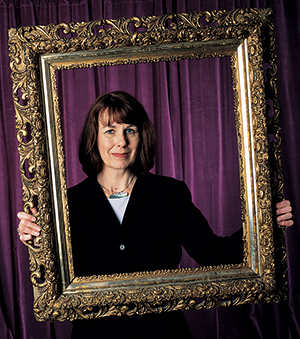 There’s a joke among Social Work Professor Susan Kemp’s students. The day they leave her office without an armload of books and articles, more good ideas and a deeper understanding than they walked in with, will be the day that hell freezes over. Students and colleagues describe her as extremely well-read and a sensitive resource for problem-solving.
There’s a joke among Social Work Professor Susan Kemp’s students. The day they leave her office without an armload of books and articles, more good ideas and a deeper understanding than they walked in with, will be the day that hell freezes over. Students and colleagues describe her as extremely well-read and a sensitive resource for problem-solving.
“I’m just a passionate learner myself and have always been fascinated to browse around for the knowledge that lies, not necessarily right in front of you, but sometimes to the side,” explains Kemp. “I have strong interdisciplinary interests. I’m a non-linear thinker and tend to want to make connections to things that are not always self-evident. So I tend to be full of statistics and things students might want to read, just to pique their interests and take them to a place they might not have thought about.”
Kemp, who in 1996 received the school’s Student Choice Teaching Award, is a champion of social justice and equity for disenfranchised and marginalized populations, as well as for students who need extra support. “Students of color and international students have a special affinity for Susan,” writes one of her doctoral students.
Kemp’s life experience makes her more aware of these issues. A native of New Zealand, she earned her bachelor’s and master’s degrees there and did doctoral work at Columbia University in New York. She has practiced social work in both countries. Her husband is Maori, of the indigenous people of New Zealand, and her children are bi-racial. “I’ve been an international student myself and bring a transnational perspective as someone who’s worked in several different countries,” she says. “I care deeply about inclusion and full participation for all within a community, whether that’s in my classroom, the school as a whole or social services.”
Students in Kemp’s classes often find themselves pushed beyond what they thought they could do. “I have a high-support, high-demand teaching style,” says Kemp, adding that she’s never satisfied with mediocrity. “I have an incredible faith, borne out by long experience, that my students can reach higher than they think.” She coaxes exemplary performances out of students by expecting it, by encouraging it, and by giving them many chances to accomplish it. “They have a sense that I’m in there with them but also have high expectations for them, and I believe that they can meet them. And they do.”
While continuing to teach, Kemp has worked as associate dean for professional degree programs for the past two years. As an administrator, she has led a large-scale transformation of the M.S.W. curriculum, to put it more in line with the school’s mission of social justice, be more responsive to the communities and agencies that social workers serve, change some structural and content issues, and work on inclusion and diversity issues.
Thinking about teaching through the lens of the curriculum has been rewarding, Kemp says, but she looks forward to returning to full-time teaching. Like all of the professors receiving the Distinguished Teaching Award, Kemp is somewhat surprised and humbled by the recognition. “I feel incredibly honored to have my students and peers believe that my teaching makes a difference and is valued,” she says. “Teaching is like many other forms of practice — you never see the results in the near term. You hope that things pay off for students that you work with, but it’s not always right there in front of you to know that.”
Richard Johnson
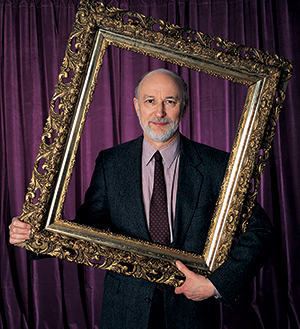 This winter, Professor Richard Johnson became the third in a series of legendary professors to deliver the popular UWAA History Lecture Series. The sold-out lectures told the story of the American Revolution through the eyes of Benjamin Franklin, John Adams and Thomas Jefferson. In a letter recommending Johnson’s nomination for a teaching award, History Chair John Findlay compared Johnson to the series’ predecessors. “Is Johnson better than Bridgman? Were the 1999 Yankees better than the 1927 Yankees? Audiences and students speak about Professor Johnson just as glowingly as they have spoken about Professor Jon Bridgman and, before him, Professor Giovanni Costigan.”
This winter, Professor Richard Johnson became the third in a series of legendary professors to deliver the popular UWAA History Lecture Series. The sold-out lectures told the story of the American Revolution through the eyes of Benjamin Franklin, John Adams and Thomas Jefferson. In a letter recommending Johnson’s nomination for a teaching award, History Chair John Findlay compared Johnson to the series’ predecessors. “Is Johnson better than Bridgman? Were the 1999 Yankees better than the 1927 Yankees? Audiences and students speak about Professor Johnson just as glowingly as they have spoken about Professor Jon Bridgman and, before him, Professor Giovanni Costigan.”
Putting yourself in another’s place and making connections is what history is about, according to Johnson. As a young graduate student from England who had studied medieval history at Oxford and found himself at Berkeley in the 1960s, Johnson put himself in the place of American students and connected that experience to his British roots.
“Being at Berkeley during those rather exciting times made me interested in the growth of political society, the achievement of political stability, and those kinds of themes,” he says. “I was surprised to find American students so wrapped up in politics, but, of course, it was an extraordinary time, and Berkeley was very much the center of the political world in those days.” Johnson was struck by how seriously Americans took their citizenship and how they always drew upon their revolutionary past to legitimize and analyze the present.
And so he became one of the few people not of American extraction to specialize in the study of American colonial history. “American history is an extraordinary story and one that has enormous impact on the development of the world today,” Johnson says.
While he was at Berkeley, a movement to study history from the viewpoint of ordinary people of the time was emerging. Johnson adopted the new methods of social history, and is an outspoken proponent of looking at history from a multi-cultural viewpoint. His courses incorporate material on Indians, farmers, women, African Americans, Hispanics, and other people often overlooked in textbooks.
Johnson runs a slightly more formal, less democratic classroom than many of his peers, but is known for his dry humor. “Part of my curiosity about the past is always for the human stories, the slightly ironic anecdotes,” Johnson explains. “I find that they work in teaching. They contribute to a useful and sociable atmosphere conducive to learning. And cheerfulness keeps breaking in.”
He recalls one lecture he was giving about the Great Awakening, a religious revolution in colonial America. Right at the moment when he was talking about itinerant ministers, someone shouted from the back of the classroom, “Jesus is coming to campus on Wednesday!” Johnson used the well-timed outburst, linking the comment to his lecture. “Being able to call upon things as they develop, sometimes unexpectedly, and even to make parallels with contemporary situations is something that remains a source of satisfaction to me,” he says.
“I want to push students to take full advantage of their time here,” Johnson remarks. He hopes students realize that the skills they acquire in college will be useful to them in their development as individuals. “I’m committed to the study of history as a wonderful way of communicating those skills.”
As for the rest, Johnson says, “I have a lot of sympathy for people who have to teach less-interesting subjects.”
Jim Morrow
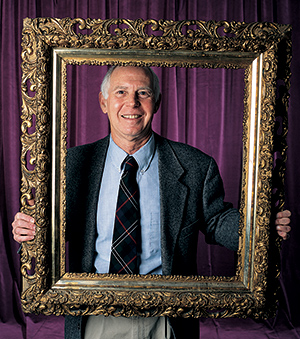 Professional mathematicians hear it all the time: “Math is so hard for me. I’ve never been good at math.” But Professor Jim Morrow’s students talk about math much differently. His students speak of math in reverent terms.
Professional mathematicians hear it all the time: “Math is so hard for me. I’ve never been good at math.” But Professor Jim Morrow’s students talk about math much differently. His students speak of math in reverent terms.
“This class was certainly my bridge from viewing math simply as a tool to seeing it as beautiful in its own right,” says one student, referring to a course he took from Morrow. “While the material is intrinsically beautiful,” writes another, “I doubt I would have become so enthusiastic about it had I not had a teacher whose love for the subject was clear.”
How students become so enamored with mathematics is a mystery to Morrow. “I’m constantly surprised at the way things work out,” he says. “I just do my best to tell them what I think is interesting. Maybe my enthusiasm is catchy.”
Morrow’s enthusiasm influences students beyond the realm of his UW classes in a host of special programs he directs or co-directs: Mathday, which draws 1,200 high school students every year; a National Science Foundation grant program called Research Experiences for Undergraduates (REU), in which students do mathematical research; the new Summer Institute for Mathematics for a select group of high school students; and teams of UW students that he coaches in competing — and winning — in an international math contest. “I have been in contact with such an unusually good group of students over the years,” he says. “I almost feel like I follow their lead sometimes. It’s easy to catch them afire.”
“He devotes an extraordinary amount of time and energy to his students and to improving undergraduate education,” reports a group of students in a letter supporting Morrow’s nomination for a Distinguished Teaching Award. “He is responsible for leading countless students to success and enjoyment in mathematics.”
A born natural with math, Morrow remembers the joy of solving a difficult math puzzle involving monkeys and coconuts as a sixth grader, a puzzle his father couldn’t solve. Teaching is inherent to his makeup, as well. Some of his peers remark that math and teaching are seamlessly integrated in Morrow. “When I understand something, I love to explain it to other people, to the point where some people run away when they see me coming,” Morrow jokes. “My kids laugh at me all the time when they ask me a simple question and I go on for 20 or 30 minutes.”
Math is not just for whiz-kids, he maintains. What makes people good at math is “not necessarily some unusual talent, like fantastic memory or ability to calculate in your head,” Morrow says. “There’s definitely a certain talent that’s needed, but more than that, there’s got to be a personality component to it, which I think of as patience and persistence. Good math students all have it. They’re willing to keep at something that might be discouraging in the beginning, until they figure it out.”
Morrow describes his students as “fearless” and says, “The biggest reason for the success of my teaching is that the students I’ve been involved with have been so good that I don’t really have much to do. They’re so impressive, it’s hard to brag about them enough. Any good things that get said about me, you have to say about the students.”
Ruth Rea
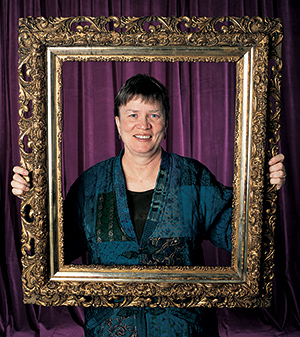 When Ruth Rea went looking for a second career, she sought a job as rewarding as her 27 years in the Army Nurse Corps. She found UW Tacoma.
When Ruth Rea went looking for a second career, she sought a job as rewarding as her 27 years in the Army Nurse Corps. She found UW Tacoma.
“To see students evolve and develop those higher thinking skills, to hear students share their dreams — that’s amazing,” she says. “This place is really special.”
Rea, a nursing professor at UW Tacoma since 1998, draws on her experience in the field to help her busy students comprehend new ideas in nursing.
“Some of them, their workday starts at 5 a.m. and they’re in evening classes with me,” she said. “I try to be sensitive to their time frame, and I try to take the complicated, complex concepts I’m teaching and make them easier to understand.”
Rea holds a Ph.D. in nursing administration from the University of Texas, an M.S. in nursing from the University of Colorado, and a B.S.N. from the University of Maryland. She joined the Army as a way to pay for college, intending to study for four years and give the next three to her country. Somehow, she ended up staying.
“I thought about leaving,” she said. “But it just never happened.”
By the end of her career, she was a full colonel and director of the Madigan Army Medical Center Education Unit. She retired from the Army in 1995 and quickly realized that she was too young to be idle. “I think I failed retirement,” she said. “I had a need to be creative and productive.”
Rea worked as a lecturer for St. Martin’s College before taking an open seat on the UW Tacoma faculty. She quickly became popular among nursing students.
“When I met Dr. Rea, I met someone who not only interacted with me, but fed my appetite for knowledge while keeping me hungry for more,” one student wrote in a letter of nomination for the Distinguished Teaching Award. “Dr. Rea can take any subject and make it fun, interesting and exciting.”
Rea said she encourages students to approach learning in unique ways and creates tools that help. She involves students in the “Dead Numbers Game” to teach statistics and breaks the students into “Survivor” groups, like the television show, to encourage teamwork.
“Students do push themselves to learn,” she said. “But sometimes, you have to use a bit of entertainment to get their attention and maintain it.”
Rea said she was “amazingly humbled and pleased” to receive the award.
“I work really hard on my teaching,” she said, noting that she is the third member of UWT’s Nursing department to be honored. “There’s definitely a synergistic energy here. It’s a good group.”
Suzanne Sikma
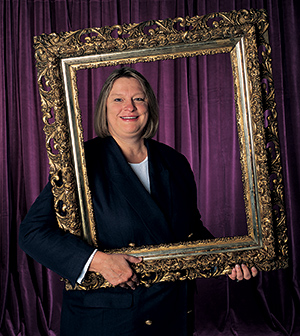 “Caring is the metaphor and ethic that guides my philosophy of teaching,” says UW Bothell Nursing Professor Suzanne Sikma, a recipient of the 2003 UW Distinguished Teaching Award.
“Caring is the metaphor and ethic that guides my philosophy of teaching,” says UW Bothell Nursing Professor Suzanne Sikma, a recipient of the 2003 UW Distinguished Teaching Award.
Sikma believes that valuing the learner is the foundation of effective teaching. To this end, she makes the effort to know her students as individuals, trying to understand the different needs, styles, commitments, boundaries and interests they bring to the educational experience.
“I encourage questions and try to model reciprocal relationships with students, other faculty and staff,” says Sikma, who has been at UW Bothell since 1997. “It is critical to connect students with — and optimize their use of — diverse learning resources both at UWB and in the community.”
This desire to value, respect and challenge her students and to understand their diverse backgrounds, perspectives and opinions in the classroom creates a rich educational environment.
“She has the ability to help her students learn the application of theory for use in our lives and work situations,” says Debbie Pronk, a UW Bothell nursing student. “Each of us participate in class in ways that push the envelope of challenge and discovery. We then have new insights and tools which can be applied in our health care settings and in our community.”
Diversity and multicultural awareness are critical to nurses working in today’s health care and community environments. In her classroom, “students learn how to make the best use of their own diverse expertise, cultural backgrounds, interests and styles,” Sikma says.
“Suzanne is an exceptional teacher,” says Nursing Professor Emeritus Anne Loustau, former director of the UWB nursing program. “She comes to academic teaching with a strong background in staff development education and clearly understands the importance of an adult education model in instruction. She is … living proof of the importance of the scholarship of discovery.”
Sikma’s current research focuses on the elderly. Her work in gerontological nursing, caring and self-determination also enhances her teaching. She was named one of 11 scholars in the 2002 Geriatric Research Scholars and Fellows Program, sponsored by New York University’s Division of Nursing.
Sikma’s dedication for teaching, coupled with her passion for community practice and focus on the elderly, enables her to create a classroom setting that invites the exchange of ideas and observations.
“Valuing learners includes working sensitively with students who need assistance and encouragement due to language skills, preparation, or other differences,” says Sikma. “We all continue to learn together from each other.”
Excellence in Teaching Award
Recognizes outstanding educators who are teaching assistants.
Anita Lenges
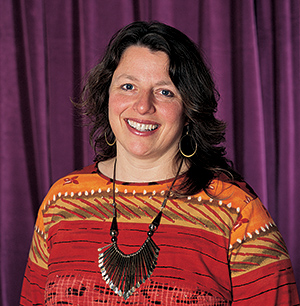 Department: College of Education
Department: College of Education
Courses Taught: Mathematics Methods for Prospective Teachers, Responsive Math and Science Teaching, Teaching Math in Secondary Schools
Achievements: Through a series of group discussions, Lenges encourages her students to express and examine their diverse viewpoints to solve problems. She instructs her students how to meet the needs of individual students who have unique learning curves, believing it’s the teachers’ responsibility to reach students on every level of the educational ladder.
Quote: “Anita has an ability to inspire us to do the very best work that we can. She both validates where we are now … and shares with us a vision for what we can become. She knows when to praise us for our strengths and when to press us to reach for the next level of excellence in practice.”
Rebecca Nugent
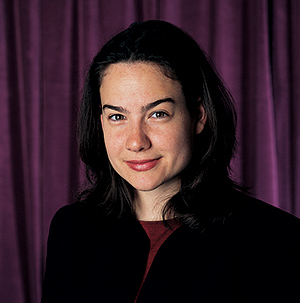 Department: Statistics
Department: Statistics
Courses Taught: Elements of Statistical Learning
Achievements: Following the mid-quarter death of a statistics instructor, Nugent stepped in with lecture notes and homework problems that helped the replacement instructor take over the course without missing a beat. She was also instrumental in the creation of the Statistics Tutoring and Study Center, augmenting help students were receiving through faculty and TA office hours. She used her influence as graduate student representative to successfully lobby for the center, which opened its doors for the first time this spring.
Quote: “She has fabulous communication and organizational skills, and can focus her energies effectively in making UW a better place for our students to master concepts and skills in our quantitative fields of statistics and probability.”
Distinguished Graduate Mentor Award
Recognizes an outstanding faculty member who advises graduate students.
Charles Keyes
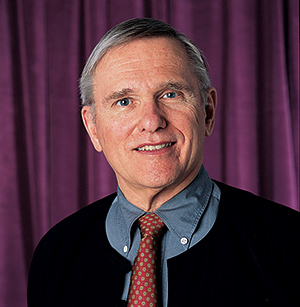 Department: Anthropology; 38 years at UW
Department: Anthropology; 38 years at UW
Courses Taught: Literature and Society in Southeast Asia, Anthropological Study of Religion, Religion in Comparative Perspective
Achievements: Known to his friends and colleagues as “Biff,” Keyes has taken great lengths to make sure his students — many of whom hail from Southeast Asia — feel comfortable in their new surroundings. The impact his guidance has had on the lives of his students extends far from the classroom, leading many to consider Keyes a friend as well as a mentor. He once helped a student obtain her Ph.D. just months before she died of cancer, then made the trip to Thailand with several of her closest friends, all of whom were students of his, to spread her ashes in her native country.
Quote: “Biff embodies not only what it means to be a dedicated adviser and scholar, but what it means to be a friend. Those of us lucky enough to know him … know that he is indeed one of the best things that ever happened to us. His deep commitment to his students and his field goes beyond professional integrity.”
S. Sterling Munro Public Service Faculty Award
Recognizes a faculty member who encourages community-based instruction.
Anthony Ishisaka
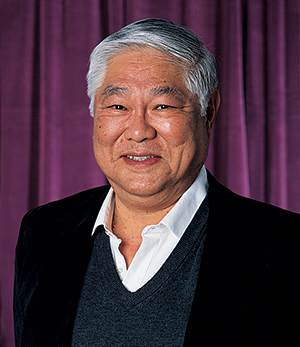 Department: School of Social Work; 31 years at the UW
Department: School of Social Work; 31 years at the UW
Courses Taught: International Social Work and Globalization, Development of the Minority Child, Social Work with Refugees
Achievements: Ishisaka helped to create the School of Social Work’s first service learning opportunities with ethnic minorities in the Seattle area. The curriculum’s success garnered national attention and allowed Ishisaka to create many educational partnerships with Seattle-based agencies that revolutionized the school’s relationship to the community. He also jump-started four training programs aimed at enhancing the skills of social workers dealing with Southeast Asian refugees.
Quote: “His tireless commitments … have meant that many refugee and immigrant populations of color have been provided the opportunity to not only survive but provide a vast array of contributions to the city of Seattle.”
Outstanding Public Service Award
Recognizes a faculty or staff member rendering exceptional public service.
Dena Brownstein
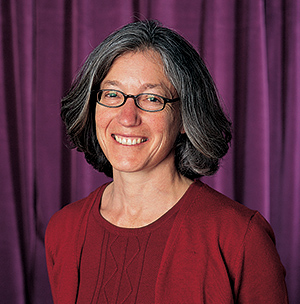 Department: School of Pediatrics; 18 years at UW
Department: School of Pediatrics; 18 years at UW
Achievements: Realizing paramedics had little training in emergency child care, Brownstein began riding along with local paramedics in order to learn their on-scene challenges. Through her efforts, she was able to perfect a unique training course in the management of pediatric emergencies that became the model for the nationally recognized Pediatric Education for Prehospital Professionals course, which has already trained more than 17,000 emergency-care providers. Brownstein has also fought successfully to make Washington one of the few states to require pediatric life-support training for any care provider in the trauma system.
Quote: “Dr. Brownstein is a consensus all-American physician and public servant. She is among only a few physicians in this country whose creative vision and relentless efforts have personally elevated the clinical practice of prehospital pediatric emergency care in communities across America.”
Lifelong Learning Award
Recognizes a faculty member recognizing exceptional service to continuing education.
Kirk Beach
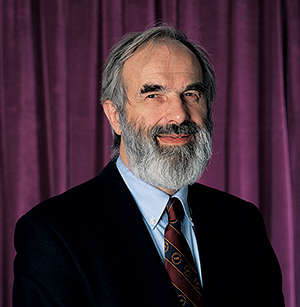 Department: Medical Engineering; 28 years at UW
Department: Medical Engineering; 28 years at UW
Courses Taught: Ultrasound Physics, Chemical Reactor Design, Electrochemical Engineering
Achievements: A physician and engineer, Beach has helped to make the University of Washington’s medical engineering program one of the foremost continuing education programs in the country. In 1996, he created the Master of Medical Engineering Evening Degree Program, which instructs students in fundamental biological disciplines and medical fields. In addition to teaching his own course, Beach has gone through each of the program’s 11 courses and three term-length laboratories, allowing him to become a mentor to faculty as well as students.
Quote: “With diplomacy and dogged determination, Beach overcame a multitude of academe’s territorial and bureaucratic obstacles, securing all the necessary approvals and funding (for his program).”
Distinguished Staff Award
Recognizes outstanding service to the university by its staff.
James Gladden
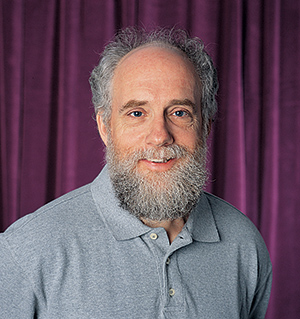 Department: Chemistry
Department: Chemistry
On the Job: Manager, Technical Services; 28 years at UW
Achievements: Gladden, ‘71, first garnered recognition from the Department of Chemistry as an electronics designer and troubleshooter more than 20 years ago. From there, his technical wizardry earned him positions as head of the electronics shop and director of technical services. Gladden has designed and built a handful of devices that have saved the UW more than $1 million over the years, including a Nuclear Magnetic Resonance (NMR) spectrometer whose design plan was incorporated into the commercial consoles of one of the world’s leading vendors of NMR consoles.
Quote: “When Jim speaks, I listen very carefully. He is intensely analytical, he is creative, and he is humane. His efforts impact every aspect of the instructional and research programs in this large and complex department.”
Betty Jo Kane & Paula Walker
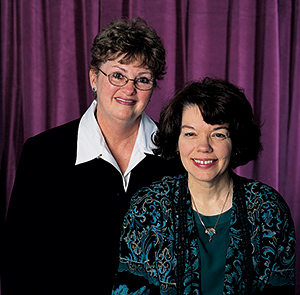 Department: University Libraries
Department: University Libraries
On the Job: Kane is the manager of the libraries facilities operation; 20 years at UW. Walker is the assistant director of libraries; 27 years at UW.
Achievements: The two-year, $47 million seismic renovation of Suzzallo Library wouldn’t have been possible without the help of Kane and Walker, ’75, who served as liaisons between the construction team and the UW library community. It was their job to coordinate the project and ensure sufficient library services were provided to faculty and students without interruption. They were also responsible for relocating more than 70 staff members to temporary off-site offices, as well as moving and re-moving more than 1 million books. Kane and Walker pulled it all off without a hitch, and even managed to save the UW several millions of dollars by compressing the construction schedule by four months.
Quote: “Without their superior and sustained efforts, exceptional level of energy, positive outlook and dedication to public service, it would have been impossible to keep the construction project from negatively affecting library services to the students, staff, and faculty of the University.”
Jennifer Mas
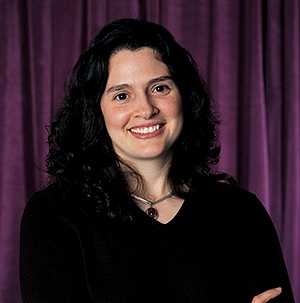 Department: School of Medicine
Department: School of Medicine
On the Job: Manager, Program Operations; three years at UW
Achievements: Mas is responsible for the overwhelming success of the SPARX program, which was designed three years ago to attract UW health sciences students into careers that serve the underprivileged. In addition to running the SPARX program, Mas also volunteers to serve in it. Each week she drives health sciences students and faculty members around in a SafeLinks van so that they can provide basic health care to a large number of local street youth.
Quote: “Her skills in helping students find common meaning through service to others has made this program a success. The SPARX program was among the reasons why the UW School of Medicine received the 2002 Award for Outstanding Community Service.”
Laurel Sercombe
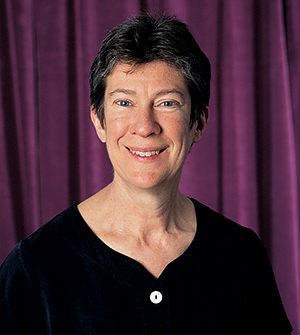 Department: School of Music
Department: School of Music
On the Job: Archivist, Ethomusicology; 24 years at UW
Achievements: For the past two decades, Sercombe, ‘77, ‘01, has been the “keeper” of the UW’s Ethnomusicology Archive, which is just one of three university-based ethnomusicology archives in the nation. Her passion for the work has made sifting through the 6,000 audio tapes, 150 films, 300 videotapes, 500 historic phonograph recordings and 300 musical instruments easy for students, faculty and visiting scholars. Sercombe has also lobbied to make the archive more accessible to the public, as well as successfully applying for two grants, from the National Endowment for Humanities and the National Film Preservation Council, that will help transfer decaying films to other media.
Quote: “She is a delightful and keenly intelligent scholar and musician, completely dedicated to her exceptional advocacy for the archives, and to the importance of its educational mission. One could not imagine a more caring steward for this tremendous cross-cultural resource.”
David Snyder
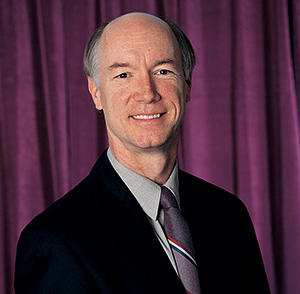 Department: UW Bothell Campus Media Center
Department: UW Bothell Campus Media Center
On the Job: Technical Services Supervisor; 29 years at UW
Achievements: After 26 years on the Seattle campus, Snyder, ‘74, moved to UW Bothell in February 2001 to tackle the state-of-the-art ePodium system, a multi-media teaching system that exists in every classroom on campus. Since his arrival at UWB, Snyder’s become the “paramedic” of classroom support. His quick response and technological know-how have kept faculty members at ease and the system running smoothly.
Quote: “Dave’s positive attitude and sense of humor continually brought lightness to the work environment, whether it was in his office, the hallway, or in the classroom.”
Distinguished teachers text by Beth Luce, a Seattle-based free-lance writer; Jill Carnell, UWT staff writer; and Cynthia Scanlon, UWB director of marketing/communications. Other awards text compiled by Columns Intern Derek Belt, a junior in the Department of Communication.